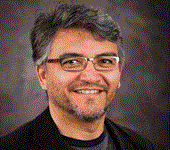August 30, 2012
Collaborative research: Project looks at land change in Brazil's Cerrado due to ethanol and sugarcane expansion

Marcellus Caldas, assistant professor of geography and principal investigator, and Jason Bergtold, associate professor of agricultural economics and Tian Xia, associate professor of agricultural economics, co-principal investigators, have been awarded a $525,000 collaborative grant with the University of Kansas from the National Science Foundation's Geography and Spatial Science Program.
The project was selected among 136 proposals considered by the evaluation cycle and will study the impact of land-use and land-cover change in the Brazilian Savannah, or Cerrado – the second largest biome in Brazil.
The biome is one of the world’s biodiversity hotspots from the expansion of sugarcane production and associated economic factors related to increased biofuel production. One of the main ideas of the project is to predict future land-use and land-cover change under different biofuel market and policy scenarios.
This project aims to enhance the understanding on how market demand, supply and government policy have affected the behavior of both the ethanol industry and the farmers who are providing an increasing supply of sugarcane via land conversion in Brazil. Researches will also seek to understand the extent existing agricultural cropland, pasture or native vegetation is being converted to sugarcane.
With bioenergy and its human and ecological impacts the subject of debate among policymakers and civil society in Brazil and elsewhere, this research bears implications for conservation initiatives and sustainability. The research will build international partnerships via participation of Brazilian academic and government agency research personnel ensuring that project results will be widely disseminated in Brazil and the U.S. One of the goals of the project is to ensure future international collaboration on the impacts of bioenergy expansion in Brazil and create the basis for comparative work between the U.S. and Brazil.
This project will contribute to graduate training and doctoral work at Kansas State University.
